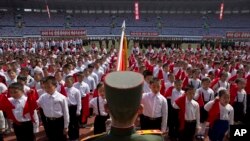YANJI, CHINA —
China often describes its relations with North Korea as being as close as lips and teeth, but when tensions rise on the peninsula they test the strength of those ties. In the border city of Yanji, in China’s landlocked northeastern province of Jili, it is clear just how close those ties are and how much the two need each other.
Even as tensions on the Korean peninsula build, business keeps going between the North and this border city of Yanji.
At a local seafood distribution center, a manager surnamed Wang shows off a large hairy crab with meaty claws that was caught off North Korea’s shores. The crabs are shipped in each night, then packed in boxes of ice and flown as far away as Shanghai.
Wang says tensions on the Korean peninsula have had little impact on his business because, as he puts it: “everyone needs to eat.”
“There really is no crisis, really the only challenges we face are at sea, such as typhoons, the inability of boats to go out to sea or seasonal fishing bans,” said Wang.
Crabs are just a part of the $5 billion in annual trade between China and North Korea. China supplies the North with a lifeline of fuel and food, and gets cheap iron ore and coal in return.
The number of North Koreans working in Chinese factories along the border is growing and it is estimated that as many as 40,000 are already here.
“Chinese companies residing in the border areas are very interested in very low wage of North Korean labor, and the rich mineral resources and also they want to use North Korean human resources not just based on low wages, they are also going to employ some North Korea in advanced technology such as IT area,” said Lim Eul-chul, a professor of North Korean studies at Kyungnam University in Seoul.
Tourism to North Korea from China is also growing. Chinese state media recently reported that the industry was seeing a boom this season just as tensions were rising.
But earlier this week, Chinese tours were put on hold. At a local tourism office, employees say there is little they can do but sit around and wait for the situation to change.
At the Liujing Hotel in Yanji, the sound of Mandarin and Korean mixes freely. The hotel is run by North Korea.
The waitresses wear traditional Korean dresses, wait tables by day and perform at the hotel by night - singing and playing instruments.
They are fluent in Mandarin and speak some Russian as well. Yanji is close to Russia’s eastern border and while foreigners are few here, Russian tourists and traders are a common sight.
They say they occasionally get out for a movie, but when this reporter asked one what she thought of China, she just frowned and said she preferred Pyongyang.
Many Chinese residents here say they have no interest in visiting North Korea.
“They come over to find food, people have nothing to eat. Children can't eat and have little to wear, so they come here to earn money, to work," said one woman. "Others come here to marry. They have children and settle here, once they obtain Chinese identification they leave to South Korea and never come back.”
One Yanji resident, a man surnamed Wang, says the North Korea of today is like China during the Cultural Revolution.
“Our economic relations are mainly based on commerce, for example in there they have mineral resources, here we have cheap goods, food and oil that we can exchange," he said. "Doing business in North Korea isn’t easy and business is based on trust. There it's a bit chaotic, sometimes close the border, it's not easy to foresee what will happen next.”
However, some analysts see a window of opportunity opening, if the North would just put its nuclear ambitions aside. They note that in addition to Kim Jung Un’s recent threats, he has also spoken about building up the North’s economy and improving people’s lives.
Peking University political scientist Wang Dong says China wants to convince North Korea that it is in its best interest to open up.
“To really open up to the international community, and start a reform process that will bring prosperity to their own people, not just poverty and not just keep on saber rattling,” said Wang.
And that is something that could not only benefit the North, but China’s northeastern provinces as well.
Even as tensions on the Korean peninsula build, business keeps going between the North and this border city of Yanji.
At a local seafood distribution center, a manager surnamed Wang shows off a large hairy crab with meaty claws that was caught off North Korea’s shores. The crabs are shipped in each night, then packed in boxes of ice and flown as far away as Shanghai.
Wang says tensions on the Korean peninsula have had little impact on his business because, as he puts it: “everyone needs to eat.”
“There really is no crisis, really the only challenges we face are at sea, such as typhoons, the inability of boats to go out to sea or seasonal fishing bans,” said Wang.
Crabs are just a part of the $5 billion in annual trade between China and North Korea. China supplies the North with a lifeline of fuel and food, and gets cheap iron ore and coal in return.
The number of North Koreans working in Chinese factories along the border is growing and it is estimated that as many as 40,000 are already here.
“Chinese companies residing in the border areas are very interested in very low wage of North Korean labor, and the rich mineral resources and also they want to use North Korean human resources not just based on low wages, they are also going to employ some North Korea in advanced technology such as IT area,” said Lim Eul-chul, a professor of North Korean studies at Kyungnam University in Seoul.
Tourism to North Korea from China is also growing. Chinese state media recently reported that the industry was seeing a boom this season just as tensions were rising.
But earlier this week, Chinese tours were put on hold. At a local tourism office, employees say there is little they can do but sit around and wait for the situation to change.
At the Liujing Hotel in Yanji, the sound of Mandarin and Korean mixes freely. The hotel is run by North Korea.
The waitresses wear traditional Korean dresses, wait tables by day and perform at the hotel by night - singing and playing instruments.
They are fluent in Mandarin and speak some Russian as well. Yanji is close to Russia’s eastern border and while foreigners are few here, Russian tourists and traders are a common sight.
They say they occasionally get out for a movie, but when this reporter asked one what she thought of China, she just frowned and said she preferred Pyongyang.
Many Chinese residents here say they have no interest in visiting North Korea.
“They come over to find food, people have nothing to eat. Children can't eat and have little to wear, so they come here to earn money, to work," said one woman. "Others come here to marry. They have children and settle here, once they obtain Chinese identification they leave to South Korea and never come back.”
One Yanji resident, a man surnamed Wang, says the North Korea of today is like China during the Cultural Revolution.
“Our economic relations are mainly based on commerce, for example in there they have mineral resources, here we have cheap goods, food and oil that we can exchange," he said. "Doing business in North Korea isn’t easy and business is based on trust. There it's a bit chaotic, sometimes close the border, it's not easy to foresee what will happen next.”
However, some analysts see a window of opportunity opening, if the North would just put its nuclear ambitions aside. They note that in addition to Kim Jung Un’s recent threats, he has also spoken about building up the North’s economy and improving people’s lives.
Peking University political scientist Wang Dong says China wants to convince North Korea that it is in its best interest to open up.
“To really open up to the international community, and start a reform process that will bring prosperity to their own people, not just poverty and not just keep on saber rattling,” said Wang.
And that is something that could not only benefit the North, but China’s northeastern provinces as well.






